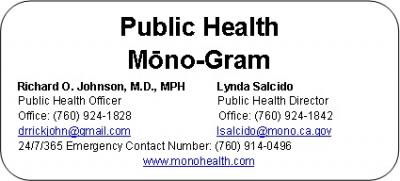Mono-Gram - Hantavirus 4/22/15
‘Tis The Season for Hantavirus
Although mice carry the hantavirus all year, this is the start of the season when humans typically begin activities that put them at risk of being exposed to the hantavirus. Spring cleaning activities, such as opening up closed buildings that have been unused overwinter, often provide habitats for deer mice and become sites for human exposure to the hantavirus. Although hantavirus infections are relatively rare, it is not unusual for us to have several cases per year in the Eastern Sierra. The risk of death is significant. Individuals cleaning areas where the mice may be present are well advised to heed the recommendations below in order to avoid exposure.
Hantavirus is carried by certain species of rats and mice, and especially the deer mouse, pictured above. Infected rodents shed the virus in their urine, droppings, and saliva. The virus can be transmitted to people when infected mouse urine, saliva, droppings, or nesting materials are stirred
up, temporarily aerosolizing the virus, which can be breathed in by humans.
We recommend the following precautions:
- seal openings that may allow mice to enter homes and workplaces;
- remove brush, woodpiles, trash, and other items that may attract mice;
- tightly close garbage cans, pet food containers, and other food sources;
- wear protective gloves to handle dead mice or to clean up nesting areas, urine, or droppings;
- before cleaning up nests or droppings found inside, open windows and doors to ventilate the area for at least 30 minutes;
- do not stir up nests by sweeping or vacuuming. Dampen areas before clean-up;
- use a disinfectant or 1-to-10 bleach-water mixture to clean up dead rodents, nests, urine, and droppings.
Early symptoms of hantavirus infection include fatigue, fever, and muscle aches. These symptoms may be accompanied by headaches, dizziness, chills, nausea, vomiting, diarrhea, and abdominal pain. Later symptoms include coughing and shortness of breath. If hantavirus is suspected, people should contact their health care provider immediately. Remember, infections with hantavirus may feel like the “flu”; however, it is no longer flu season!
For more information, including a map of surveillance activities, go to:
http://www.cdph.ca.gov/HealthInfo/discond/Pages/HantavirusPulmonarySyndr...


